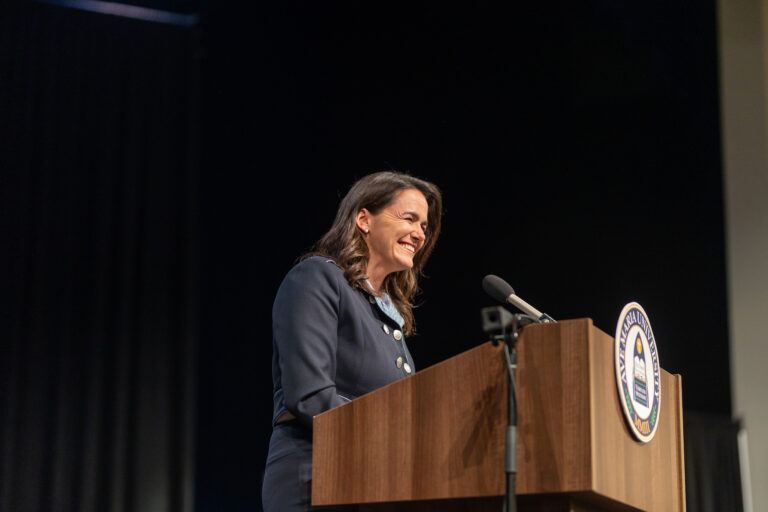This month Elizabeth Liagin concludes her remarkable history of the US government’s attack upon traditional Nigerian cultural and family life
With nearly one third of sub-Saharan Africa’s population, Nigeria is crucial to US foreign operations on the continent. Spotty fertility reductions that have occurred in a few small nations like Botswana promise to make no significant impact on future African census counts. Indeed, without a corresponding drop in Nigerian birthrates, successful measures elsewhere only increase Nigeria’s standing as the continent’s demographic giant.
Nigeria’s leadership capability is well understood. Because of its vast human resources and natural wealth, huge agricultural potential, and central location, a modernized, debt-free Nigeria would stand tall as an economic, political and military powerhouse. Indeed, Nigeria, which is frequently described by writers as the Southern Hemisphere’s “sleeping giant” or as Africa’s “hope for the future,” already dominates the region ideologically. As such, the conventional wisdom within the global population establishment is that opposition to population control in Nigeria tends to be especially contagious.
Just as a population policy is critical to directing money and authority toward family planning activities, so the cultural revision campaign is essential to changing public opinion and getting “the masses” to tolerate and eventually to avail themselves of the services.
Birth Control Propaganda
In the mid 1980s, the United States, along with a host of other industrialized nations, western-controlled monetary institutions, UN agencies, and private foundations inaugurated what could easily be called the most aggressive birth control propaganda program ever attempted anywhere in the world.
Whether one is conducting a long-term campaign of psychological warfare, a CIA-style “constituency building” operation, or a propaganda offensive to erode resistance to western birth control, there are certain rules that must never be broken.
First, messages must be repeated consistently and reinforced through a variety of sources. Second, themes must be credible, both in terms of message content and messenger. Third, the ideas expressed should reasonably conform to the expectations and presumptions of the target group. Fourth, the communications must give the impression that they reflect a spontaneous change occurring within the society rather than a deviant or alien point of view. Perhaps most importantly, when one is attempting to deceive an audience, great care must be taken not to get caught.
But over-zealous contractors, the majority of them working directly for the US Agency for International Development, failed to heed the most important rule of secret political influence. And the campaign backfired.
The 1987 State Department project document described a variety of “outreach” activities that would be directed at Nigeria’s religious leaders. Representatives of religious groups would be brought to some “25 workshops and 150 seminars to discuss the health and social benefits of smaller families,” in the words of the document, while testimonials were to be obtained from leaders giving favorable opinions on birth control. Additional meetings and orientation sessions would be held for religious groups at the national, regional, state and local levels. And carefully planned messages on radio and television and in the print media would target Nigeria’s various religious groups.
These activities were, above all, an attempt to discredit the positions taken by leaders of the Catholic Church and Nigeria’s Muslim majority. The project paper implied as much when it stated: “Misconceptions as to religious bans on family planning are widespread.” And the writers of the paper fully expected to succeed. Resistance, the document said, “should be expected to flare periodically, but diminish as acceptance becomes widespread.”
The US government’s overseas population projects are typically run by contractors selected and funded through the Office of Population at the Agency for International Development (AID). Known as non-governmental organizations or “NGOs,” these groups are useful in controversial assignments because they obscure the role of foreign governments.
In the case of the Nigerian program, there were at least a dozen major groups involved. One of those was Pathfinder International, a group based just outside Boston. According to a database of population activities compiled by the United Nations, Pathfinder’s AID agreement included an effort to “promote family planning among Islamic leaders,” to “revise source documents on Islam and family planning for theologians and teachers,” to develop “Islamic” literature in support of population policy, to provide “consultation” to institutions involved in administering population programs, and to “implement the organization and preparation of an Islamic workshop for women.”
Working with Pathfinder on the project was the Futures Group, an organization with offices in Washington, Connecticut and North Carolina that works with both AID and the Department of Defense. The Futures Group is described in UN literature as “a private organization concerned with policy analysis, development and strategic planning” that specializes in “forecasting technological, social and political developments and their impacts” for the US government. The group plays a role in “the analytical activities of several agencies,” says the UN guide.
Another participant in the Islamic document scam was the Carolina Population Center at the University of North Carolina in Chapel Hill. The Population Center assisted in the development of a 1987 document that formed the basis of the bilateral population program for Nigeria.
One Nigerian who played a key role was Dr. A. B. Sulaiman, then an official with the Nigerian health ministry, who was paid slightly more than $100,000 to arrange for an “Islamic conference on policy” and to do “policy studies,” according to an AID sub-project database. Sulaiman was also supposed to give the fake documents the health ministry’s official seal of approval.
Another sub-contractor was Abdel Rahim Omran, an Egyptian-born US citizen. Omran received $57,000 from Pathfinder for presiding over workshops on population policy and another $25,000 from the Pathfinder budget, paid through a “University of Maryland Foundation,” to write the teaching materials on Islam and birth control.
At the time the plan was discovered, Omran was acting director of the Center for International Development and Conflict Management (CIDCM). In that post, he took several trips to the Middle East to promote population control. In Yemen, says a 1989 CIDCM newsletter, Omran had taken part in a “three-day conference [which] is regarded as having led to the establishment of the first official population policy in that country.” He also participated in a conference of scholars, theologians, and demographers in Morocco, and then traveled to “several African and Asian Moslem countries to meet with intellectual and religious leaders,” the newsletter says. While abroad, he claimed to have produced a “shift in attitudes from stiff resistance to acceptance of the concept of family planning,” according to the CIDCM periodical.
The University of Maryland Foundation administers numerous research programs on the school’s College Park campus, including CIDCM. The latter is involved with the analysis of so-called “low intensity conflict” and reports on such topics as “multi-track diplomacy.” Its literature is full of references to meetings with high level officials of foreign countries, seminars on terrorism, internship programs, congressional briefings, and awards dinners. The same literature provides scant information about the source of the group’s funds, other than subscriptions to its quarterly newsletter which are to be paid by check to “University of Maryland Foundation.” A spokesperson at CIDCM was unwilling to discuss funding sources, but said that Omran left the institution approximately two or three years ago.
Omran is known to have worked in the past as a consultant to the World Bank. But even more important was his contribution to a study commissioned in 1988 by the Office of the Director of Net Assessment at the Department of Defense. A summary of the papers was published by the Center for Strategic and International Studies in the spring 1989 edition of its Washington Quarterly.
Omran Unmasked
Besides Omran, the list of panelists contributing to the Department of Defense study included a specialist on African affairs, Thomas J. Goliber from the Futures Group.
Ironically, although Omran’s “teaching manual” had been completed, it was never distributed. Before it could be put into circulation, Sulaiman, the aide at the ministry of health, bolted his government post to take over the leadership of the Planned Parenthood Federation of Nigeria, an affiliate of the London-based International Planned Parenthood Federation and an outgrowth of the old Family Planning Council set up during British colonial rule. Many Nigerians familiar with these events believe it was less a matter of Sulaiman absconding with the money than an attempt to distance himself from a potentially explosive undertaking that had grown too unwieldy to remain under wraps. One thing is certain; the change in occupation took Sulaiman far from the “radical” north of Nigeria to the relative safety of cosmopolitan Lagos.
By spring of 1991, internal Pathfinder files on the Islamic handbook project, along with the Pentagon report and copies of CIDCM newsletters, had been leaked by friends in the US to scores of Nigerian newspapers. Banner headlines proclaimed a sinister plot by a Pentagon contractor, posing as an Islamic theologian, to plant fake religious texts in Nigerian teaching institutions. The scheme was portrayed as nothing less than a Pentagon-CIA-AID conspiracy to destroy Nigeria’s growing influence in the world. New pieces of information and commentary circulated almost continuously in the press for at least two years. The ill-fated Orman text had become a point of reference for opponents of population control of all faiths. And at last, a well-organized, articulate resistance emerged. Its impact has been substantial.
“White Man’s Drugs”
Government-funded population programs for developing nations generally enjoy good press in the US. A substantial part of the public — and quite a few members of Congress, as well — seem to think of “family planning” clinics as casual, cozy places where women can pick up their “rights” in a package or gain instant upward mobility with an injection or implant. The population program has been surrounded with the language of compassion; project descriptions speak of “safe motherhood,” reproductive health, empowerment, and family welfare. Above all, such activities are presented as voluntary.
But the view from the other side of the world is a lot different. In fact, the demand for birth control is so close to nil in many places that virtually every new contraceptive user brought into the program represents an tremendous “persuasion” effort, if not outright coercion.
One research project, done in the West African country of Senegal in the late 1980s, consisted of interviews with more than 500 women at medical centers for children. Given the fact that many of the women had come with sick babies and were undoubtedly grateful for the services received, it might be expected that they would — out of politeness if nothing else — express a general interest in family planning. Indeed, they were only asked if they would be “interested,” not whether they actually wanted to use something. But out of the first hundred asked, not a single woman wanted the information. The second hundred produced exactly the same result: zero. And so it went with the next hundred, and the hundred after that, and so on, down to the very last interview. Not even one woman volunteered a willingness to learn more about western fertility control.
Birth control, explained a woman who was part of another West African fertility study, “is not right with God.” Preventing births “is forbidden,” said a man in the same group, “If you do it, God will punish you, you’ll pay for your sin.” Others referred to contraceptives disparagingly as ‘White man’s drugs.” Indeed, when people all over sub-Saharan Africa have been asked to state the number of children they hope to have, the almost-standard answer has proven to be: “as many as God sends.”
Disinterest in western “family planning” measures has been so pronounced that “demand generation” often surfaces conspicuously as the largest budget item in a national population control campaign. “Demand generation,” of course, refers to any activity or long-term process that is meant to stimulate interest in birth control and to persuade people to participate in birth prevention programs they would otherwise reject.
Thus, the survey that revealed total disinterest on the part of Senegalese women was inevitably followed by posters showing a Senegalese woman with her hand eagerly outstretched to receive a packet of birth control pills. The idea was to censure local values by disseminating images suggesting that adherence to such values is already on the way out.
In Nigeria during the late 1980s and early 1990s, the campaign was so extensive that it could fairly be described as media saturation. Journalists were summoned to “reorientation” classes; awards (labeled “bribes” by critics) were offered; publications were secretly underwritten with foreign funds; media events were staged; dramas and documentaries were produced and aired; testimonials were solicited and widely disseminated; and opponents were harassed and intimidated. And all of this was done in such a way that the foreign sponsorship was concealed.
Such campaigns can be a tremendously effective way to influence human behavior. But they carry a high risk. If the involvement of a foreign government, its methods or its motives should be uncovered by the press, an enormous backlash is sure to follow. And this is exactly what happened in Nigeria when journalists received from friends in the US scores of documents and reports confirming their worst suspicions about the program.
By October of 1992, scandals related to the population program had appeared in print all over the country. There were stories about civil damage awards in the United States for women injured by contraceptives being widely advertised in Nigeria. There was a formerly-secret US National Security Council memorandum that said Nigeria should be targeted for population control precisely because the country could easily cope with growth and because an increasing population would give Nigeria “a growing political and strategic role” in the region. There were tales about the involvement of the Central Intelligence Agency, and a lot more.
It was in this context that a group of respected scholars gathered at the University of Ibadan in the western part of the country on Saturday, October 17 of that year. The event was the “National Symposium on Family Planning, Birth Control and Western Imperialism,” organized by the Catholic Association of Medical Practitioners with the cooperation of the Islamic Medical Association and the Nigerian chapter of the World Federation of Doctors Who Respect Human Life.
US-sponsored birth control programs have been constructed tor “the maintenance of world power in the hands of a few nations,” said Dr. Michael Asuzu of the university’s College of Medicine. “Many people in Nigeria would understand this very well; i.e., the north-south, Arabic-western, Islamic-Christian political struggles, because they, too, have local versions of it. It can easily be observed that with the east-west cold war over, the only possible threat to a permanent geopolitical balance of power in favor of the secular humanist nations are the so-called angry and hungry young people from the Third World countries, especially Africa. Hence the only way to maintain this ‘positive’ balance in favor of the western powers is to reduce as drastically as possible the population growth rate of those third world countries.”
A similar point was made by Dr. Aliu O. Akano of the Department of Radiology who asked, “Is it possible that the developed nations are afraid that we may one day outnumber them?” Akano called contraception a “rebellion against the law of nature” which can never exist in a “wholly Islamic” society. “It is against the very nature of man to interfere with procreation,” he added.
“Not only are the two movements of population control and birth control historically linked, they are practically and operationally promoted by a network of people and organizations who are determined to establish a world order based on selective breeding,” said Dr. Lawrence Adekoya, a prominent Catholic lay activist from Ogun State. “As one looks carefully and more closely at the strategies of population control in Nigeria, as instigated by Planned Parenthood, one is even more convinced of an imperialist plot to keep this country down.” He called on Nigerian leaders to begin an investigation into the motives and means of population control in Nigeria, and concluded: “Our silence must stop now.”
Dr. Emevwo Biakolo of the Department of English attacked the US population program for adopting “clandestine media campaigns” based on “cold war” hostilities. US-funded groups, he charged, are working overtime behind the scenes “to influence government leaders and ministries to adopt policies and programs that undermine the long-term well-being of the nation in exchange for a short-term goal — usually the provision of conditional foreign aid, project assistance, loans, or military support.”
Like many speakers, Biakolo noted that virtually all wealthy countries back birth control campaigns against the southern hemisphere. As such, he said, they are an international problem requiring an international solution. “Both Orthodox Christianity and Islam are international,” said Biakolo. “True Muslims all over the world and genuine Christians all over the world must see this imperialist, neo-colonial demographic warmongering for what it is — an effort to subvert our beliefs and human rights, and perhaps even our very existence.”
The speaker urged Catholics and Muslims to put aside their differences and to work together, saying before an audience that included ambassadors from several countries, “We must acknowledge that any attack on any Muslim institution anywhere in the world is an attack on Christians everywhere in the world, and an attack on Christians anywhere in the world is an attack on Muslims all over the world.” And he concluded, “truth is on our side. And time is on our side.”
The well-publicized gathering in Ibadan, the publication of conference papers in book form, and the distribution of video tapes of the event, helped to energize and inform a strong intellectual counter-movement in Nigeria.
As the country struggles to establish a democratic form of government, its new leaders will be under tremendous pressure to make “deals” with the West that offer short-term options to improve the country’s economy. One can be certain that the campaign to curb population growth in Nigeria will soon be back on track and that its main focus will once again be on ideological change. The war, in other words, will be an information war, one in which Church leaders, organizations opposed to population control, and private journalists are destined to play the definitive role.
Elizabeth Liagin has spent many years covering and living in Africa. She is a regular contributor to the Information Project for Africa, a journalistic cooperative.










